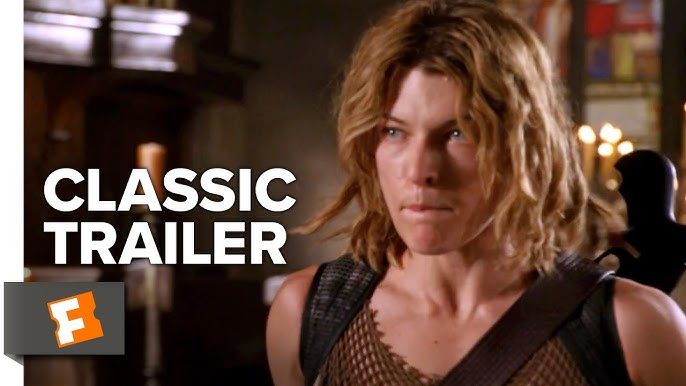Resident Evil: Apocalypse (2004)

Released in 2004, Resident Evil: Apocalypse is an action-horror film directed by Alexander Witt and written by Paul W. S. Anderson. This film serves as a direct sequel to the original Resident Evil (2002) and is the second installment in the Resident Evil film series, which is based on the popular video game franchise of the same name. With its high-octane action sequences, chilling atmosphere, and expanded storyline, Resident Evil: Apocalypse continues the thrilling narrative of the zombie apocalypse and introduces new elements that enrich the series’ mythology.
The film picks up immediately after the events of its predecessor, with the Umbrella Corporation’s secret experiments leading to the outbreak of a deadly virus in Raccoon City. As the virus spreads uncontrollably, the city becomes a quarantine zone overrun by zombies and other mutated creatures. The story follows Alice (Milla Jovovich), the protagonist from the first film, as she awakens from a coma in a hospital only to find herself in the midst of the chaos. Alice, now possessing superhuman abilities due to her exposure to the virus, must navigate the apocalyptic landscape and confront both the undead and the sinister forces of the Umbrella Corporation.
One of the film’s significant strengths lies in its direction and action sequences. Alexander Witt, making his directorial debut with Resident Evil: Apocalypse, brings a dynamic and intense approach to the film’s action and horror elements. Witt’s direction effectively captures the chaos and urgency of the post-apocalyptic setting, with fast-paced editing and explosive set pieces that keep the audience engaged. The film’s action sequences are both thrilling and visually impressive, featuring a combination of hand-to-hand combat, gunfights, and elaborate stunts that contribute to its high-energy atmosphere.
Paul W. S. Anderson, who wrote the screenplay, continues to build on the foundation laid by the first film. Anderson’s script introduces new characters and expands the narrative, incorporating elements from the video games that fans of the franchise will recognize. The film introduces key characters such as Jill Valentine (Sienna Guillory), a skilled police officer, and Carlos Oliveira (Oded Fehr), a member of the Umbrella Corporation’s mercenary team. These new additions to the cast help to broaden the scope of the story and provide additional layers of conflict and intrigue.
Milla Jovovich reprises her role as Alice, and her performance remains a highlight of the film. Jovovich’s portrayal of Alice is both fierce and resourceful, showcasing her character’s physical prowess and determination. Alice’s evolution from a disoriented survivor to a formidable force against the undead is central to the film’s narrative, and Jovovich’s performance effectively conveys the character’s growth and resilience. The film also explores Alice’s struggle with her own identity and the consequences of her enhanced abilities, adding depth to her character and emotional resonance to the story.

Sienna Guillory’s portrayal of Jill Valentine is another standout element of the film. Guillory brings a strong and confident presence to the role, embodying the character’s tactical skills and bravery. Jill’s inclusion in the film provides a connection to the video games and introduces a new dynamic to the narrative, as she teams up with Alice and the other survivors to combat the threats posed by the virus and the Umbrella Corporation.
Oded Fehr’s performance as Carlos Oliveira adds a layer of camaraderie and humor to the film. As a member of the Umbrella Corporation’s mercenary team, Carlos serves as both a combatant and a moral support for the group of survivors. Fehr’s portrayal brings a sense of humanity and levity to the film, balancing the intense action and horror with moments of character development and interaction.

The film’s production design and special effects contribute significantly to its success. The depiction of Raccoon City as a dystopian wasteland is visually striking, with abandoned streets, crumbling buildings, and hordes of undead creating a sense of desolation and danger. The special effects team delivers impressive visuals, from the terrifying zombies and mutated creatures to the explosive action sequences. The combination of practical effects and CGI enhances the film’s immersive experience and ensures that the action remains thrilling and impactful.

The musical score, composed by Jeff Danna, complements the film’s tone with its intense and driving compositions. The score’s use of dark, pulsating rhythms and dramatic themes adds to the film’s sense of urgency and tension, heightening the impact of key scenes and action sequences. The music plays a crucial role in maintaining the film’s high-energy atmosphere and enhancing the overall cinematic experience.
In summary, Resident Evil: Apocalypse is a successful continuation of the Resident Evil film franchise, offering a blend of action, horror, and suspense. Directed by Alexander Witt and written by Paul W. S. Anderson, the film expands on the story of the first installment while introducing new characters and elements from the video games. Milla Jovovich delivers a compelling performance as Alice, and the addition of characters like Jill Valentine and Carlos Oliveira adds depth and excitement to the narrative. With its dynamic direction, impressive special effects, and engaging action sequences, Resident Evil: Apocalypse stands as a thrilling and entertaining entry in the franchise. The film’s ability to balance high-octane action with character development and horror elements ensures its place as a notable and enjoyable sequel in the Resident Evil series.










